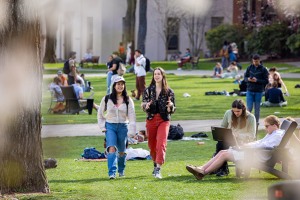PROVIDENCE, R.I. [Brown University] — As a teenager, Aliza Kopans moved from the Boston suburbs to the “middle of nowhere Vermont” to attend a semester school program, where she went four months without her cell phone. But that wasn’t the culture shock — it was coming back home.
“Here are a bunch of teenagers and nobody’s interacting with each other in this real, physical sphere, because we’re so consumed by what’s happening on our screens,” Kopans said.
But within a matter of months, the COVID-19 pandemic arrived, and suddenly, screens were the safest way to engage with her peers, which inspired a shift in Kopans’ internal monologue.
“It wasn’t, ‘How can we get rid of these devices?,’ but, ‘How can we design, teach and use them in a way that’s leveraging our shared humanity rather than extracting from our well-being?’”
